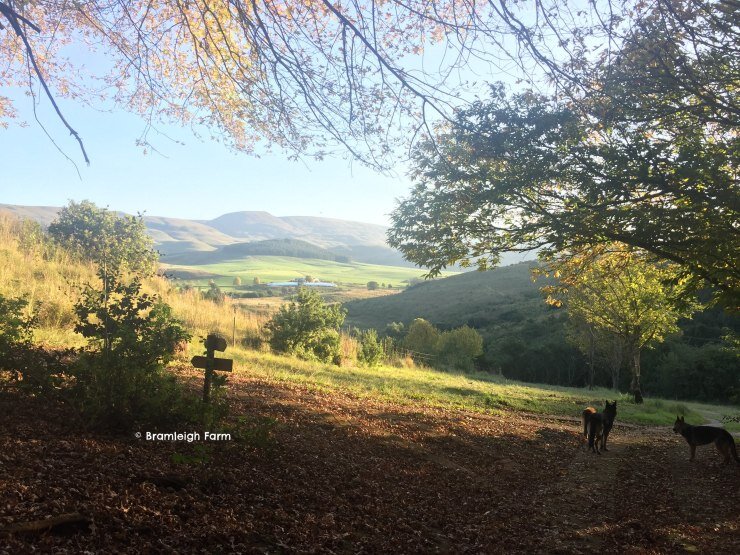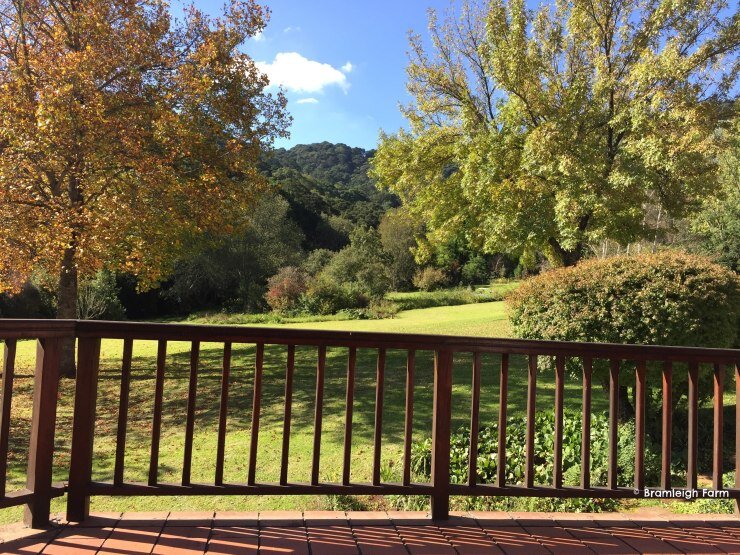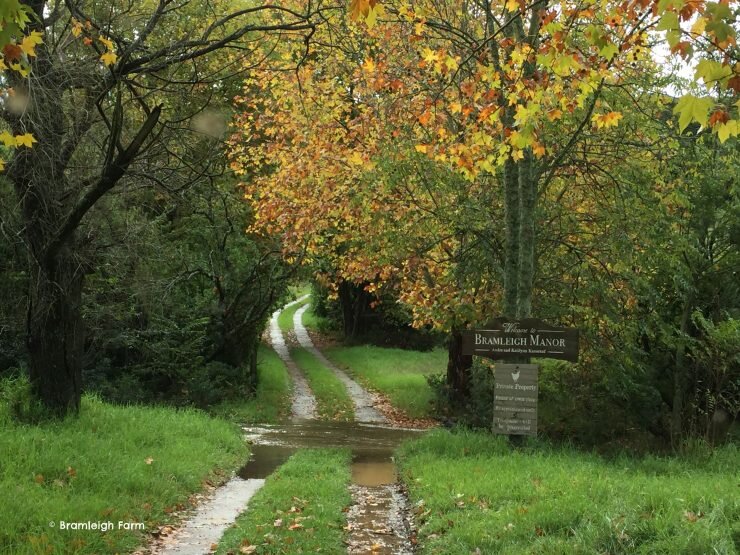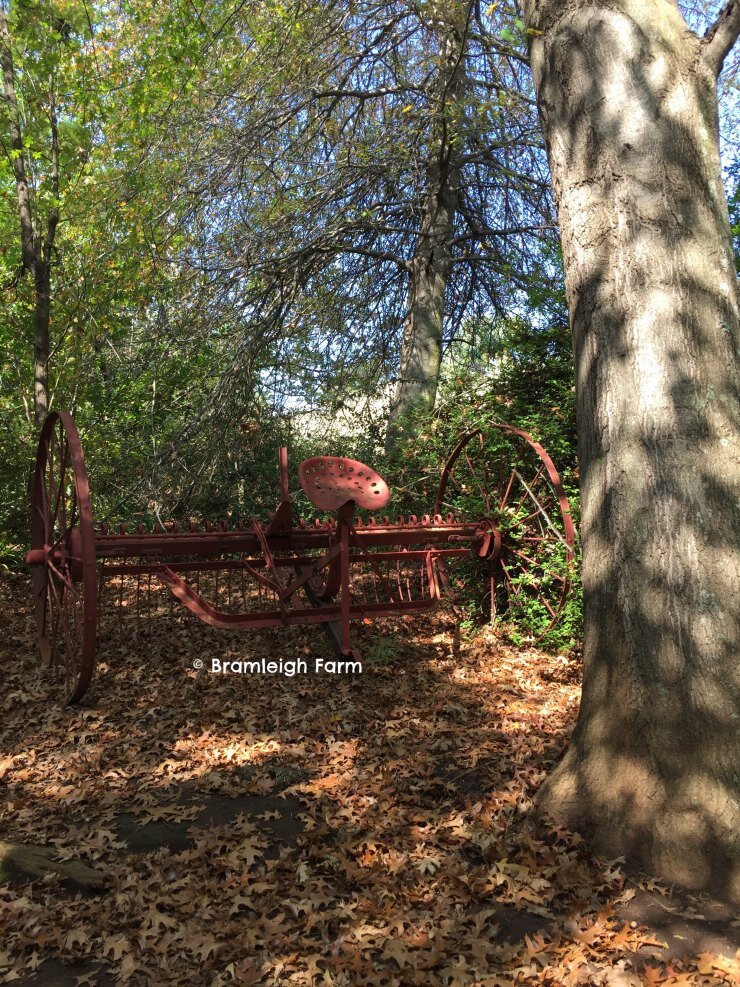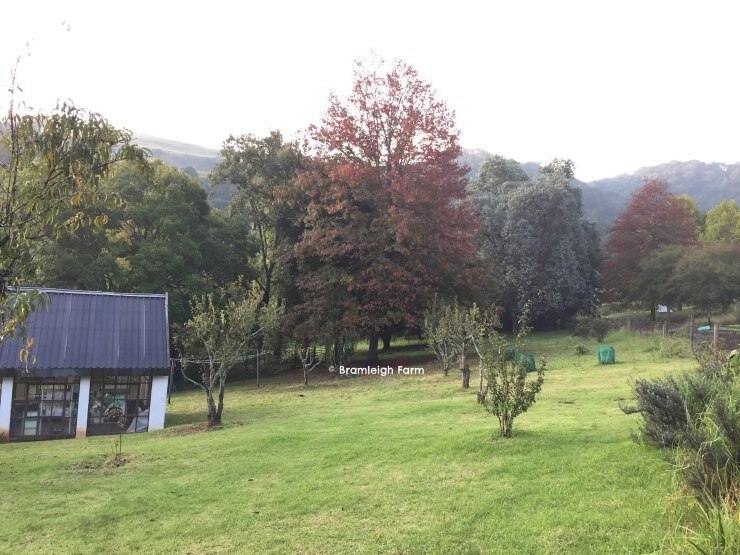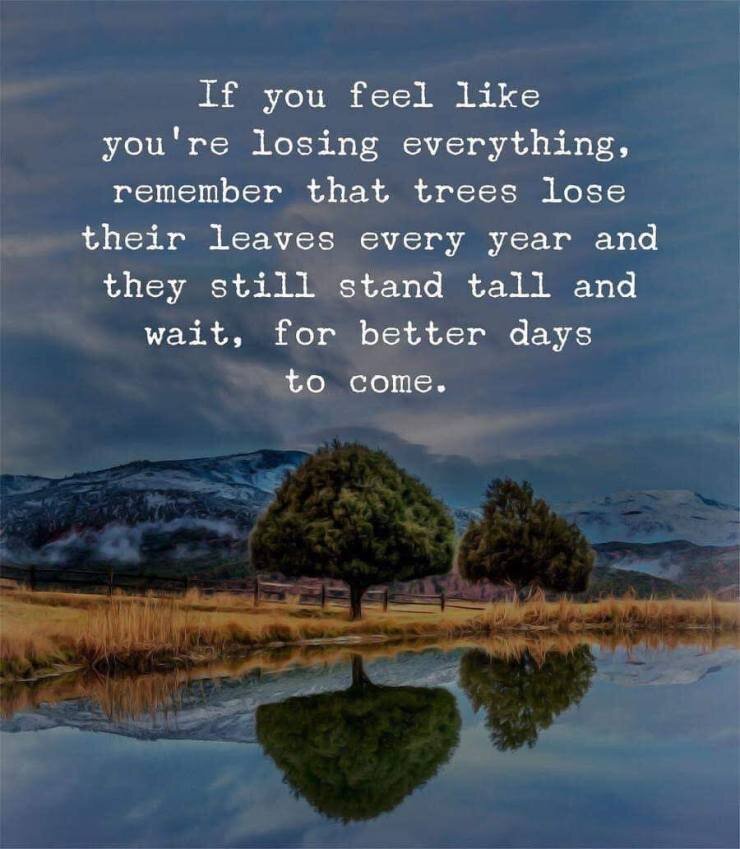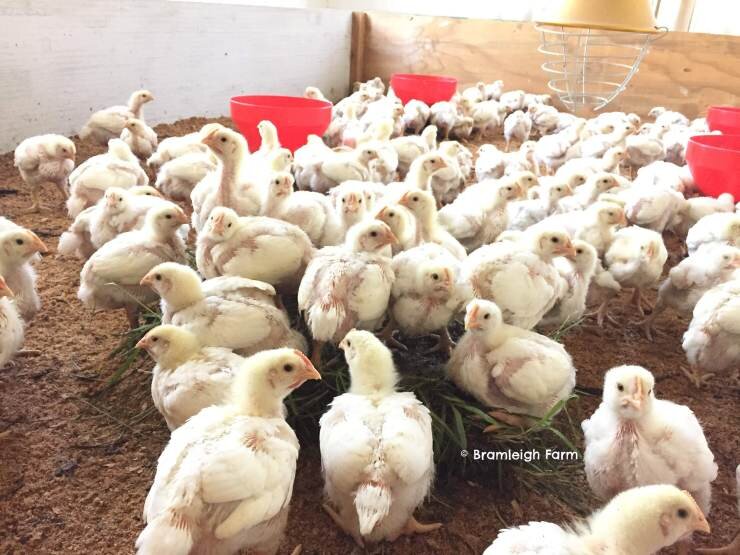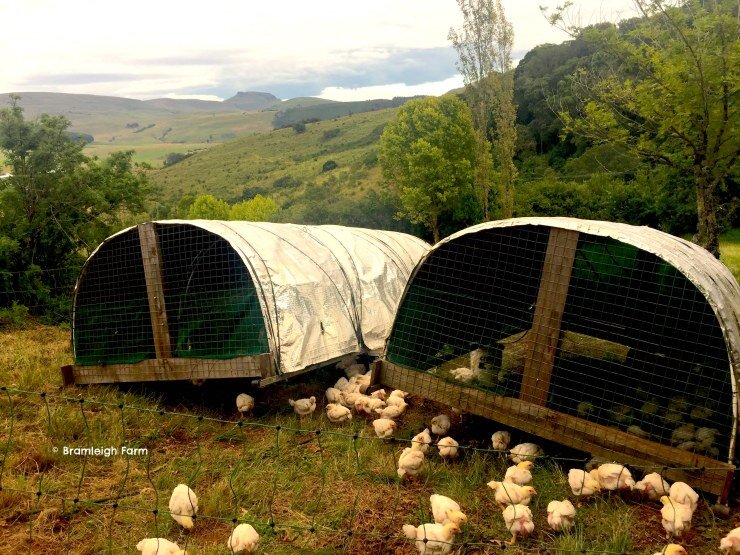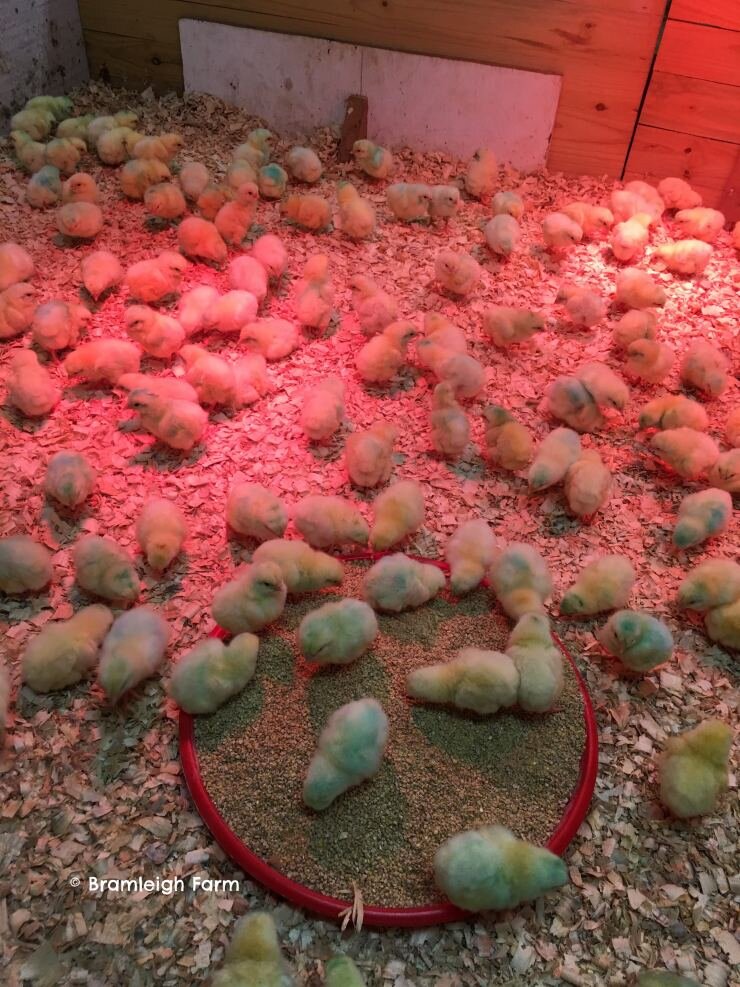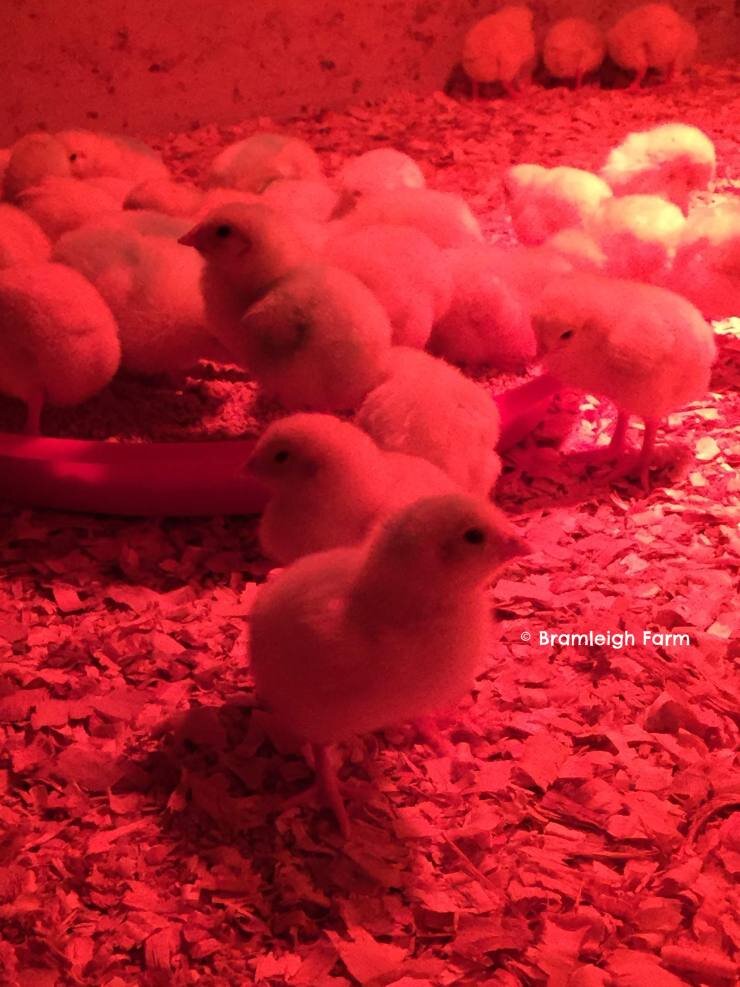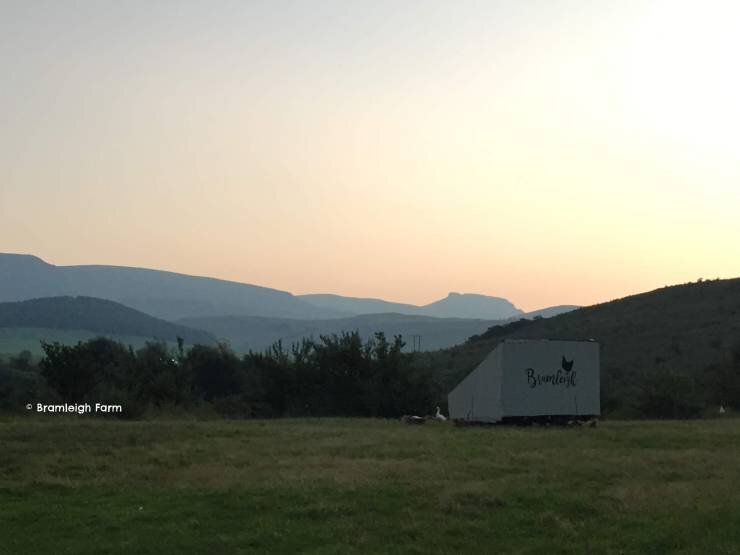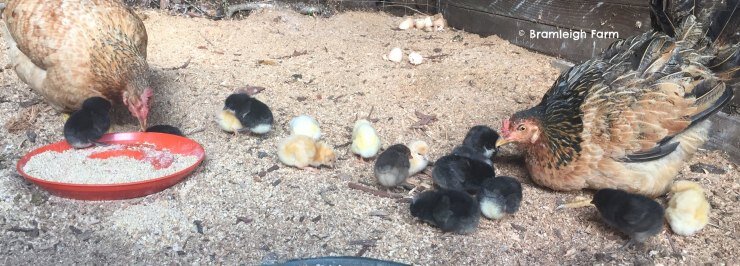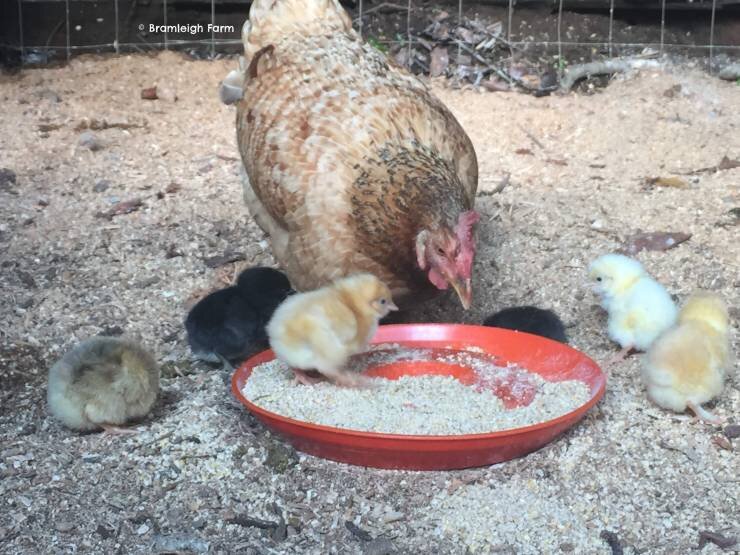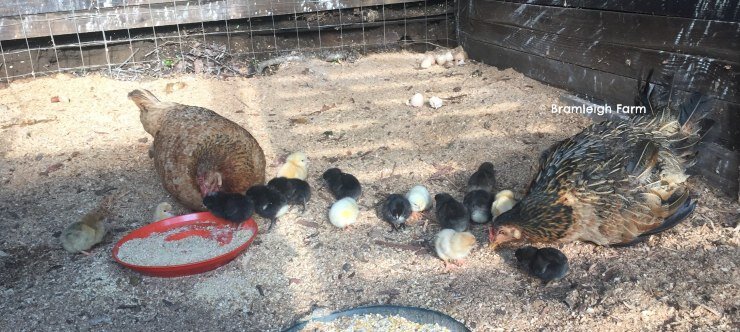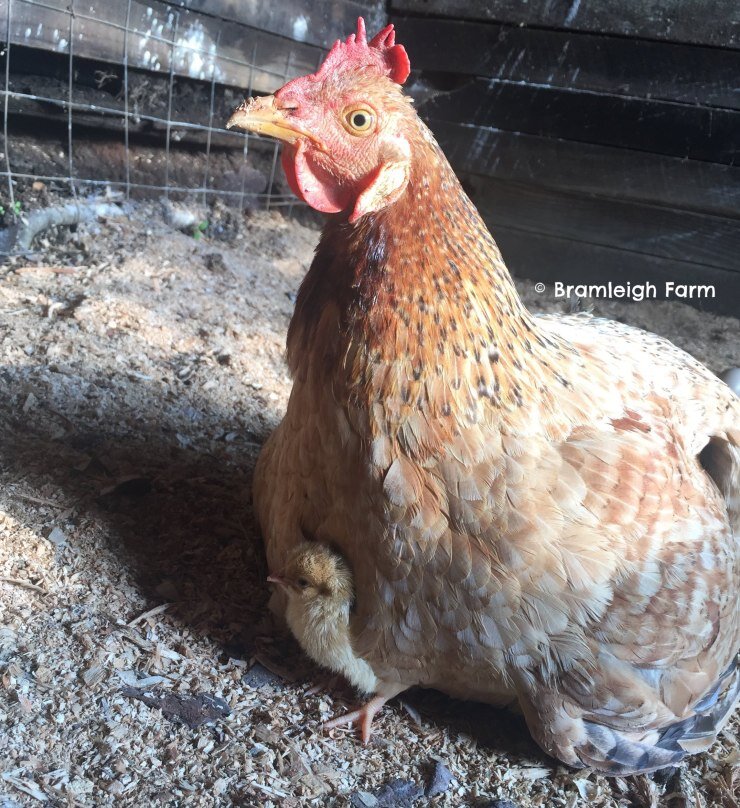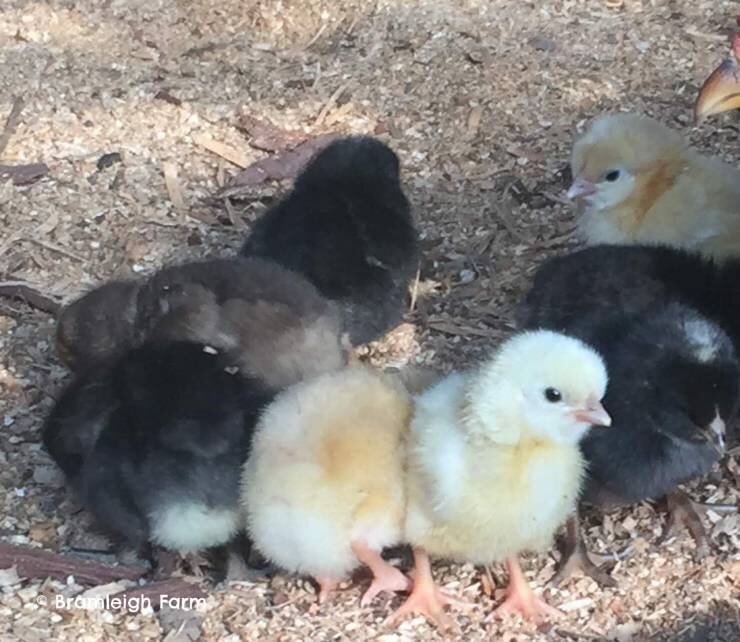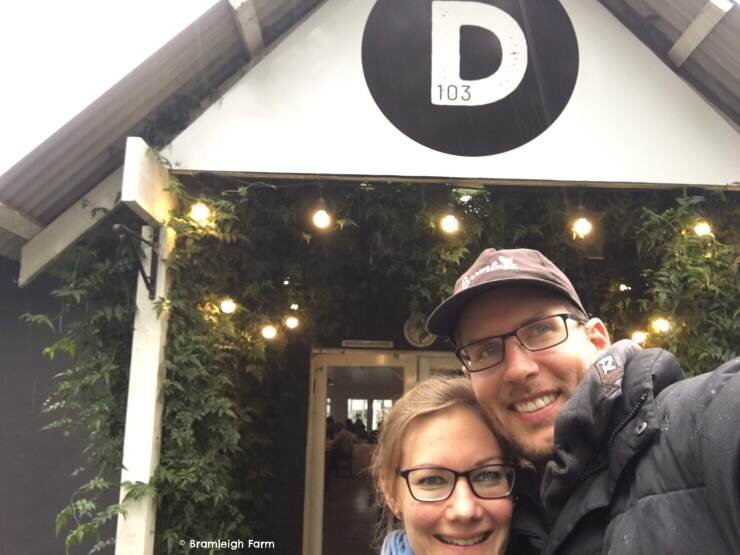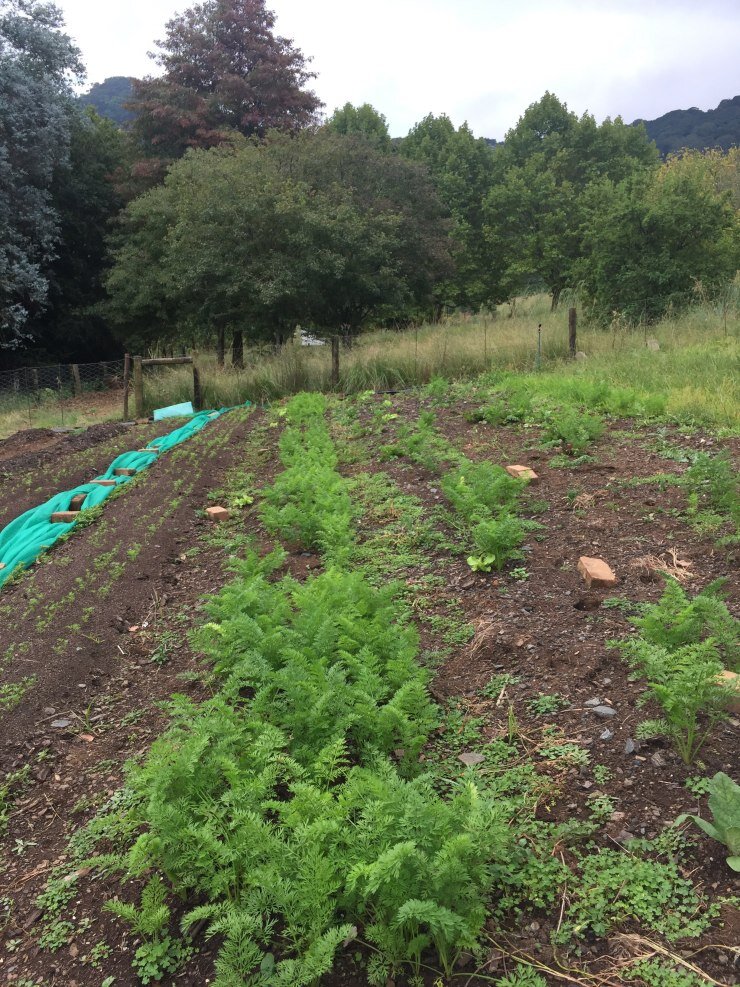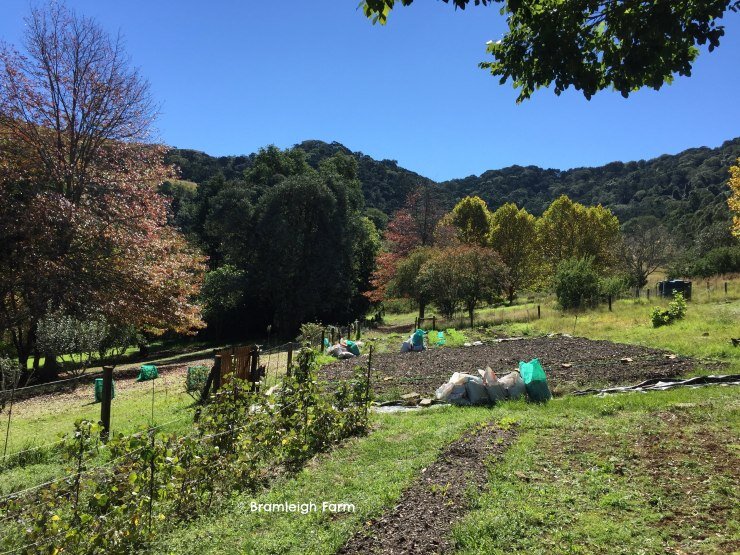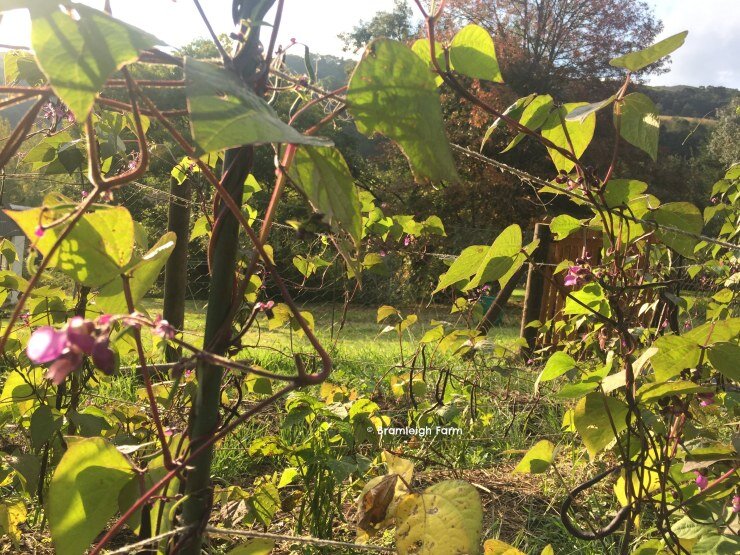April 2019
Autumn is definitely settling into the early mornings and evenings. We have had nearly 3 times more rain this April than in the previous two years, and nearly half of that fell in the last week! Some heavy downpours for days left everything waterlogged and muddy. But the stream has lulled us to sleep every night, sounding more like the ocean, and means everything is still green against the Autumnal trees... like our featured image shows - the stream in flood against Autumn trees.
At this point in the year, the season starts to take its toll. We are blessed to be able to produce our own food most of the year, but that also means that the peak growing season is long. It is around 9 months of continual input of time, energy, planning and finance. The pressure never stops. We start every week planning for what lies ahead. Each week we think maybe next week will be quieter but then there is another new busy thing - a full house weekend coming up, long weekends, vegetables needing harvesting, new batch of broilers arriving, next batch off for processing, new beds to be planted…. Each week holds its own busyness. But that is what also keeps it interesting and diverse - no week is like the week before!
Because of this, we are continually learning to balance.
Balance of work and play
Balance of small and big
Balance of ethics and economics
Balance of skills and desires
Our goal this year has been to take one weekend off a month. This generally still involves animal chores and responding to emails and phone calls but it has made a huge difference to our productivity.
One of the breaks we took was a trip to Cape Town. We decided to combine this with a visit to Farmer Angus! This has been on our wishlist for about 2 years! Farmer Angus is a regenerative and biodynamic farmer on Spier wine estate, raising broilers, layers, pigs and cattle on pasture plus he has an on site butchery purely for his animals. We thoroughly enjoyed the afternoon we spent with him, and his guys, touring the farm and butchery. We came away feeling very inspired and encouraged by seeing everything in person, and the conversations we had with Farmer Angus, in his direct, no-nonsense approach. Check out his bloghttps://www.farmerangus.co.za/blog/
-
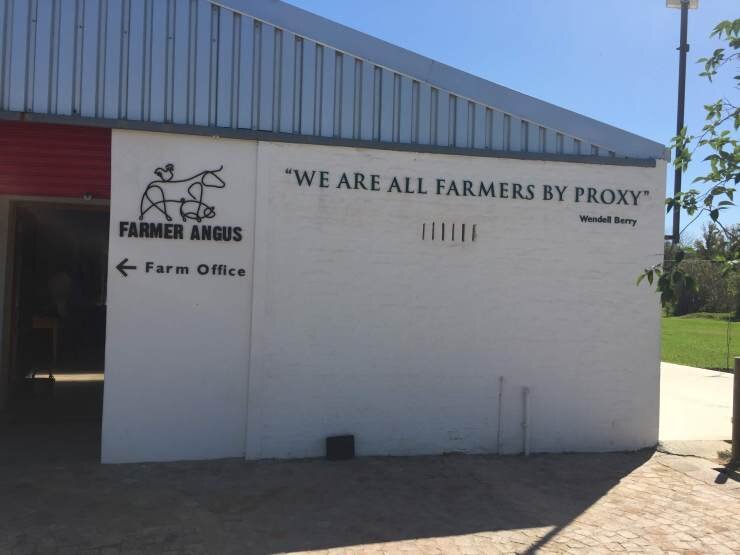
Farmer Angus -
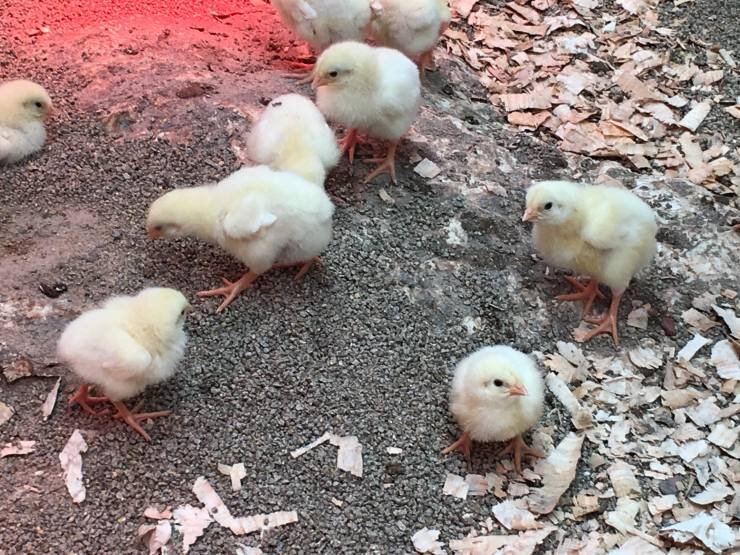
Checking out chicks in the brooder -
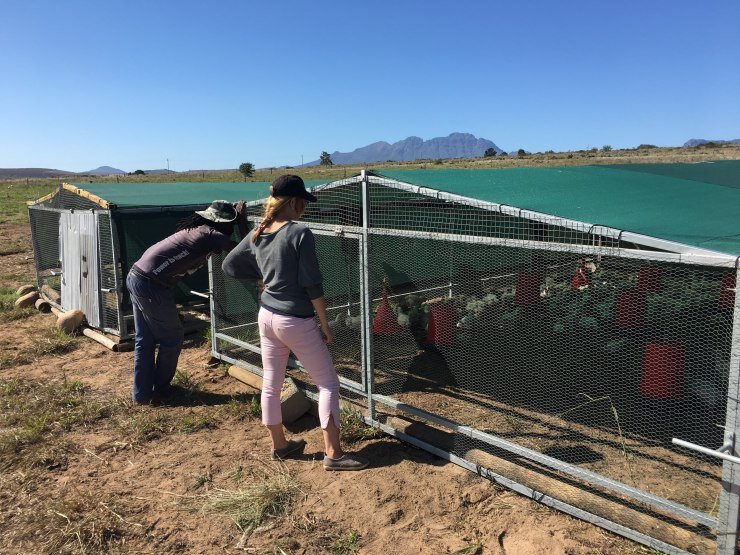
Broilers out on pasture -
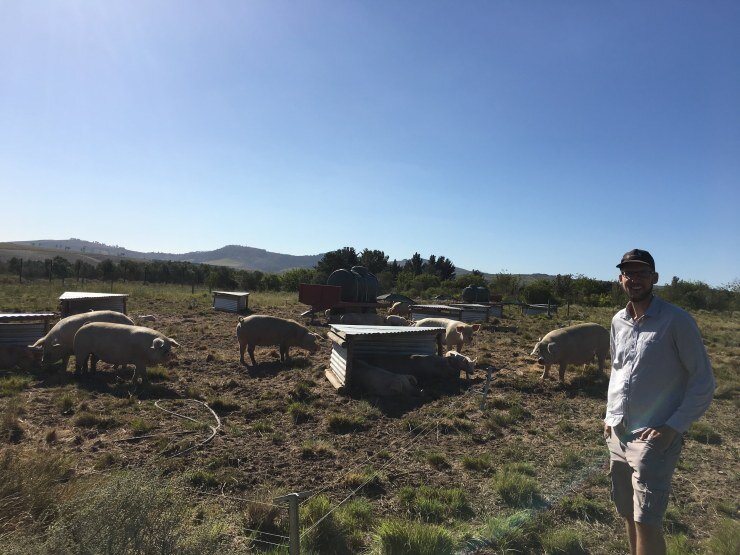
Pigs on pasture -
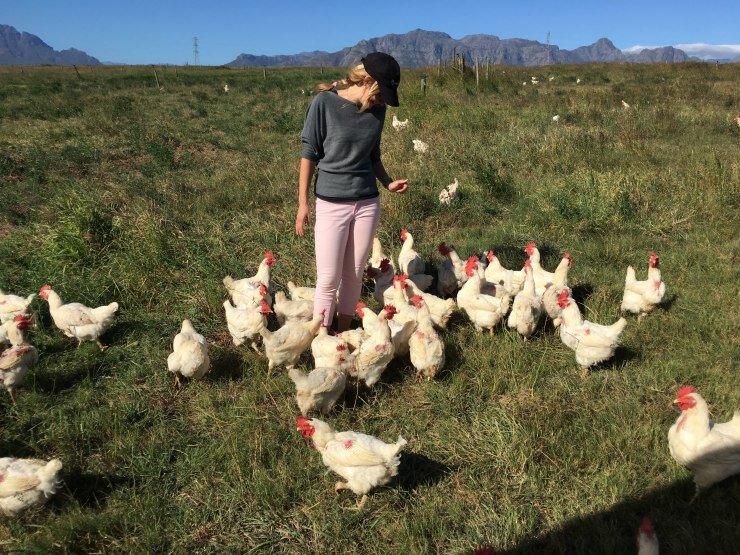
The laying flock - that didn't want us to leave! -
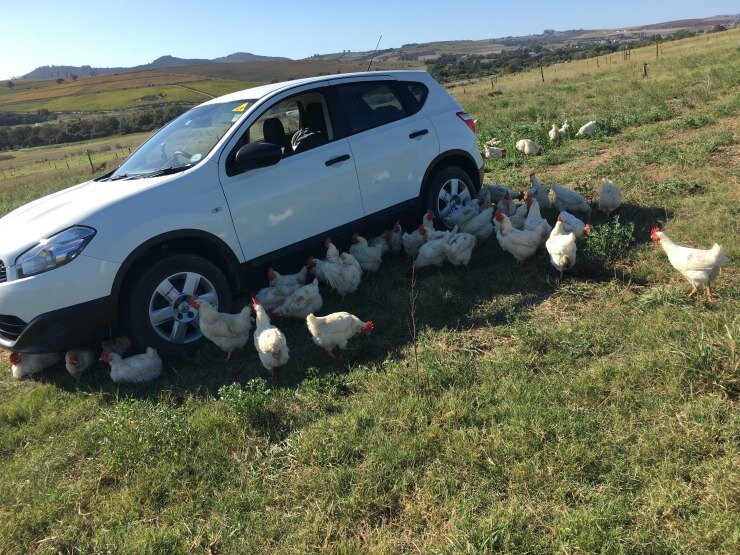
-
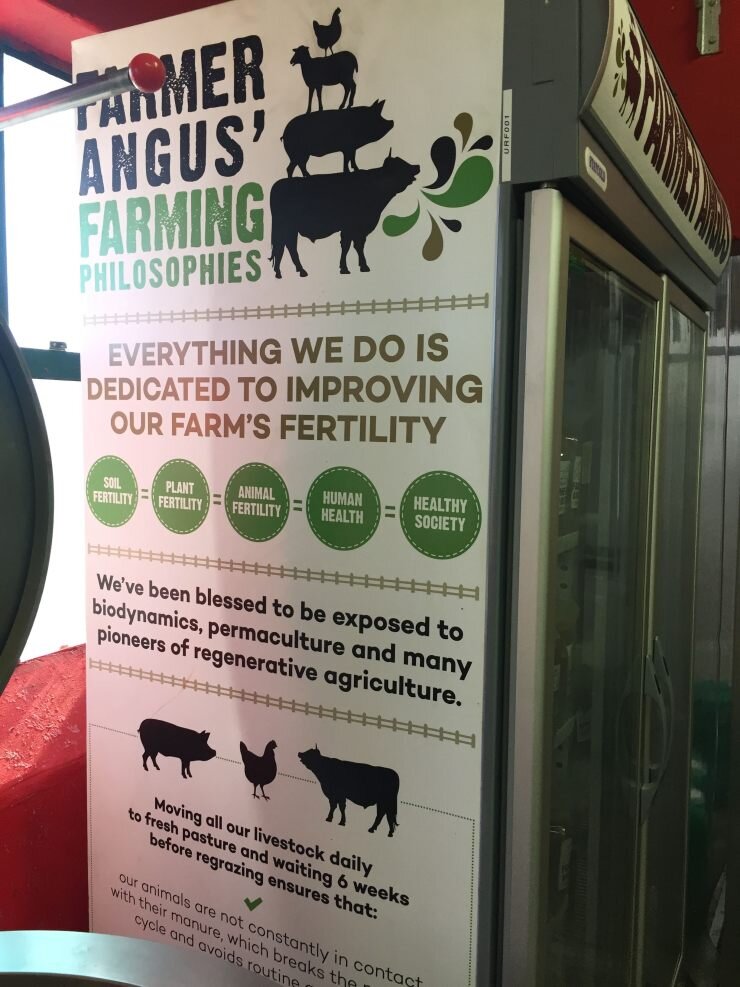
REKO
-
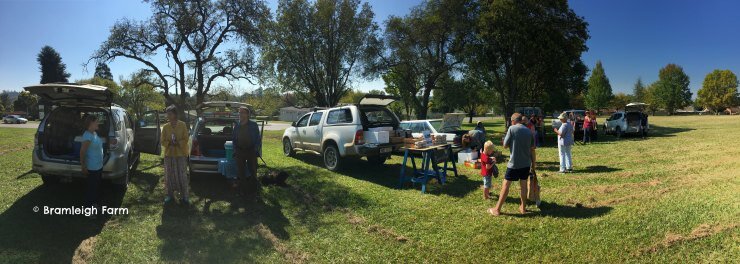
REKO HOWICK -
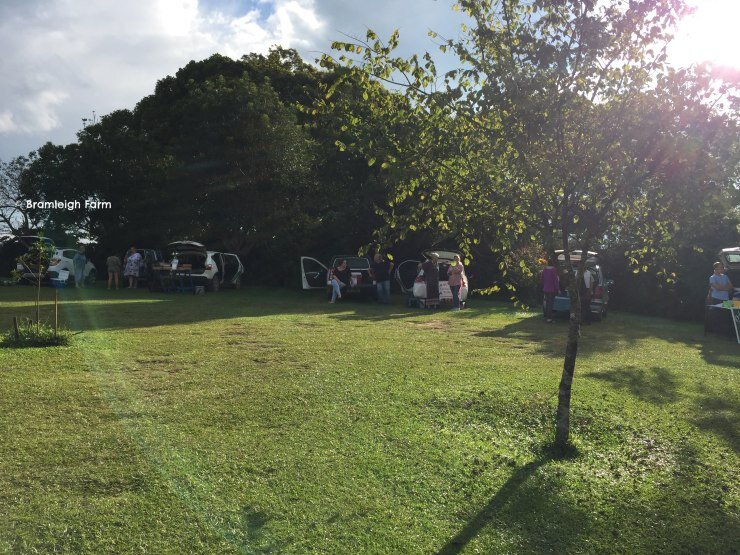
REKO HILTON -
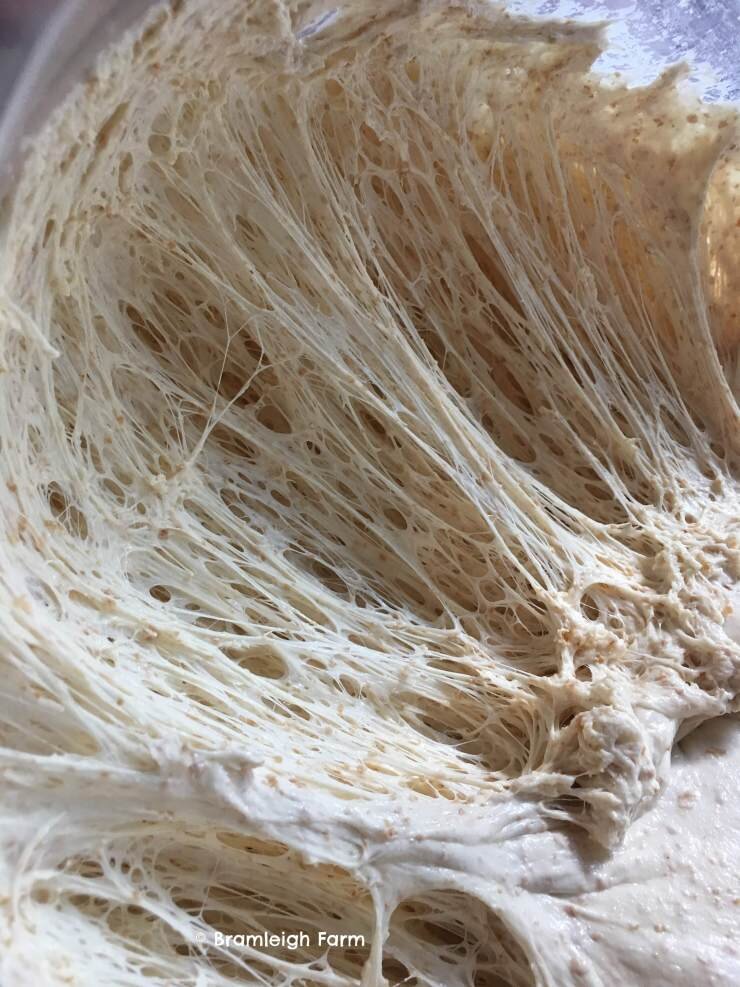
Sourdough Overload -
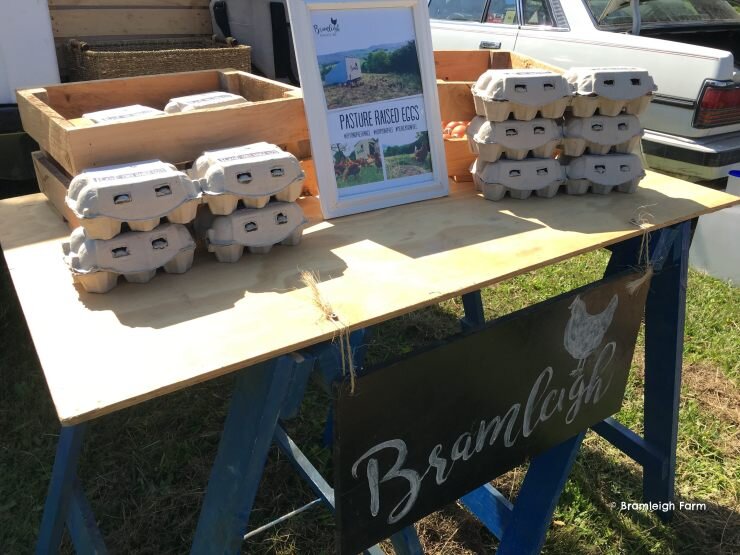
The Bramleigh stand at REKO
Reko has been steadily growing, and keeping us very busy! We sold out of chicken - a good problem to have! But luckily we still had pork… well, just chops since we have still been on the hunt for a butcher that will do sausages for us without MSG and nasties, as well as brining bacon without nitrates and nitrites. Fortunately, through REKO, we were recommended a local butcher, and again by a friend, so in the next week we will have sausages and bacon!
PASTURE RAISED BROILERS
Our broilers moved out on pasture just before our last blog post was published. They grew rapidly and have just upgraded to "even greener pastures" already. It seems really quick when measured by blog post dates but they did live a longer life than an industrial chicken, and definitely a happier one at that! Broiler chickens also go through a peak growing phase and if left too long, they enter a dangerous zone with a very high risk of heart attacks.
Just before moving outside, the chicks are given grass sods for a couple days to get used to eating grass and increased grit. They instantly climb all over the grass and there is no going back!
We have still found high losses in the brooder phase, which often cause abnormal development of the lungs and liver, resulting in weak and vulnerable chickens at a later stage. We will tend to experience high losses again after a week or so on pasture as a result of the earlier poor development. We have switched feed, switched shavings on the brooder floor, temperature control, water, vitamin supplements, you name it, we tried it. Everything on the management side, we tried. Eventually we started to question the hatchery and whether we were receiving strong chicks or not. We know that being a small guy, we are at the bottom of the list and the first to be knocked off if there is a shortage. But could this mean we also get weak chicks? A strong point towards this was apparent in our last batch where many of the chicks already had some of their wing feathers appearing through the soft yellow down. This normally only happens around Day 3 or 4. We have heard that hatcheries do sometimes keep small and weak chicks for a couple days and then pass them off as day olds. Normally day 4 or 5 is where we see the most natural loss - chicks don’t need much in the way of food and water for the first 2 days as they get everything they need from the yolk before hatching. They tend to peak around this time and then decline rapidly if there is any weakness. However, on our last batch, we had losses in the first 24 hours which is very unusual for us. This was a warning sign. Through a friend, we were able to find a small private hatchery. We started another batch with chicks from the small hatchery and will see how they go. So far, they have been much, much better. So now we test whether it is a oversight in management issue or a hatchery issue.
PASTURE LAYERS
-
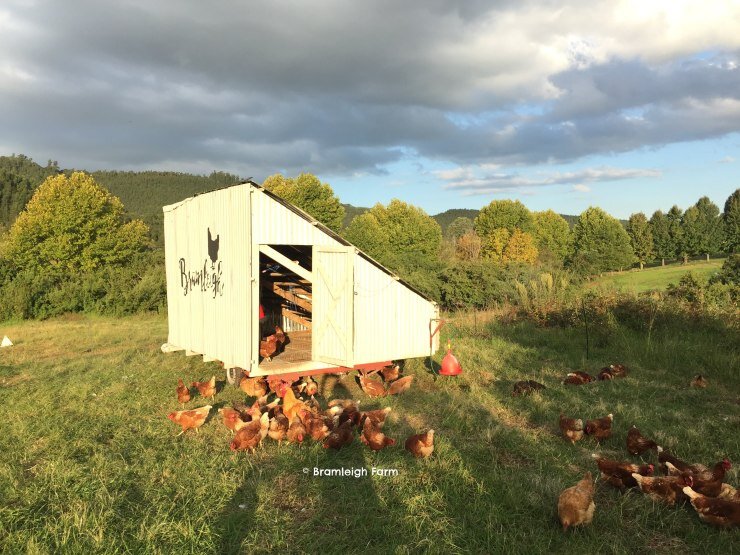
Afternoon forgaing -
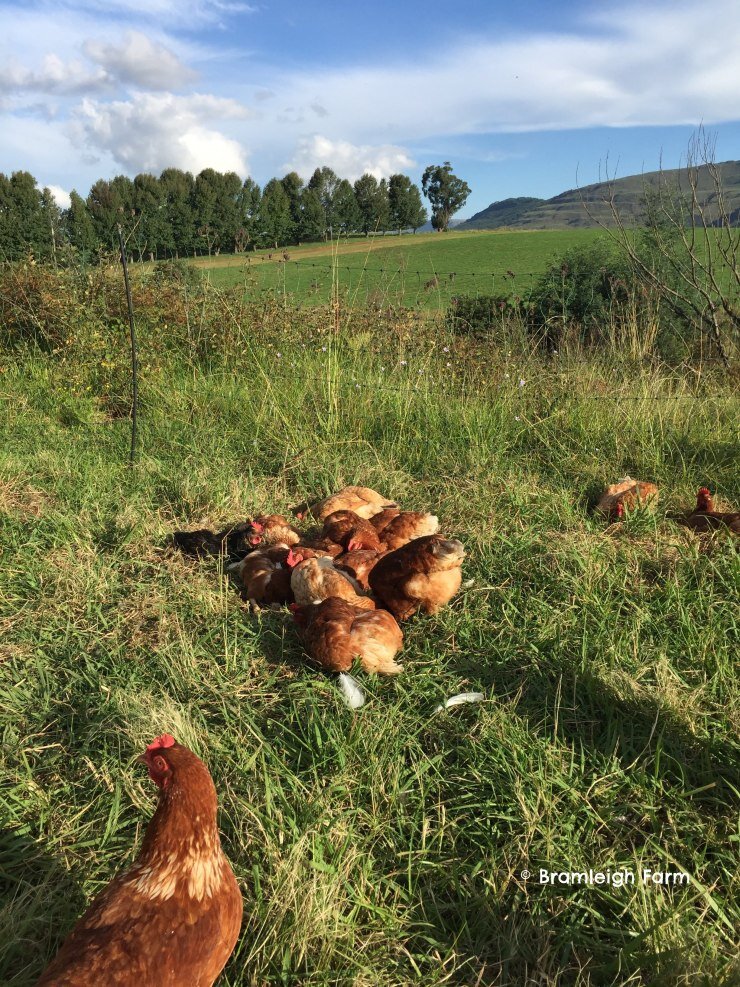
Hen Spa -
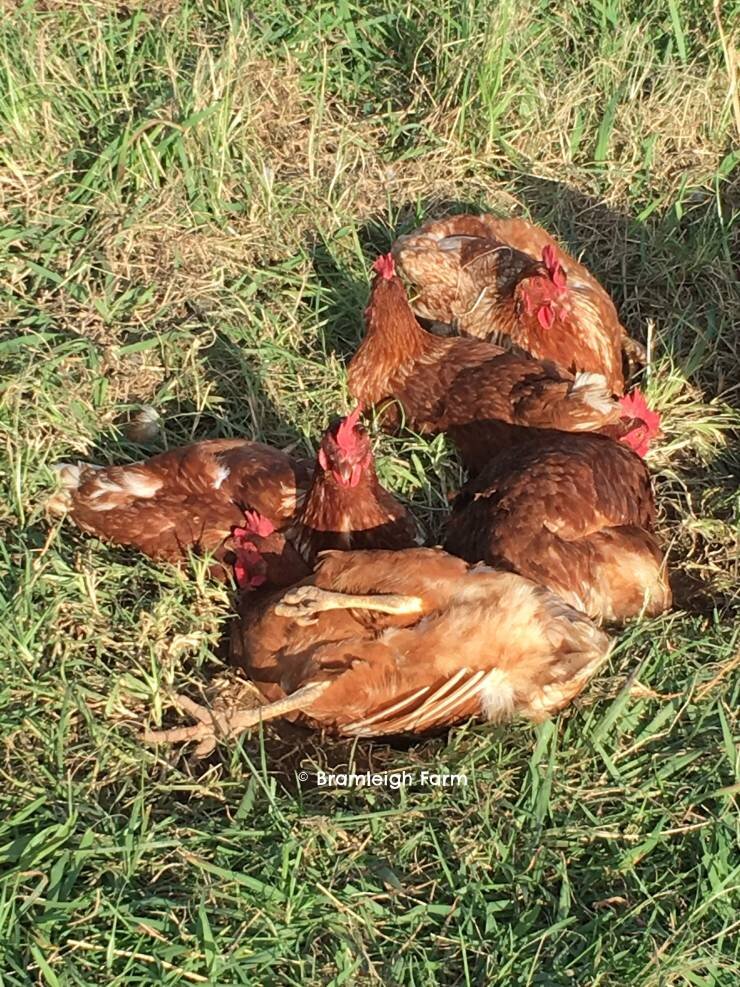
This hen isn't dead - she's thoroughly enjoying an afternoon dirt bath at the spa! -
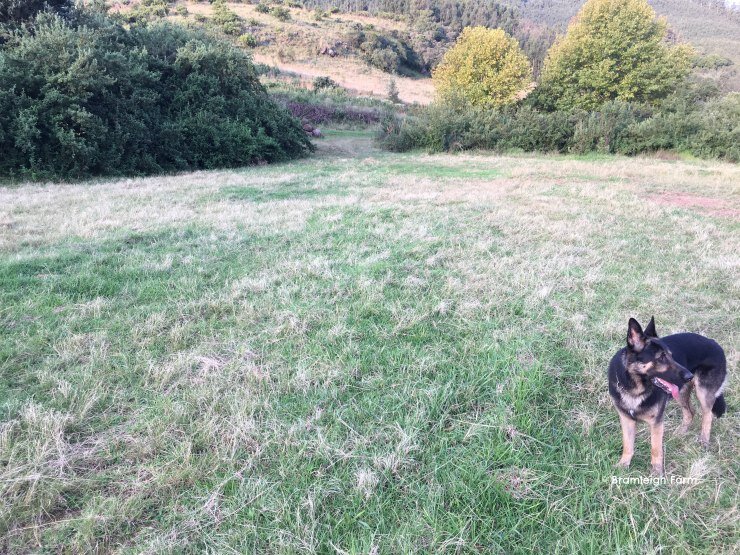
Green areas where the egg mobile previously was. Now as the grass turn Autumn gold, we can clearly see the areas of intense fertilisation -
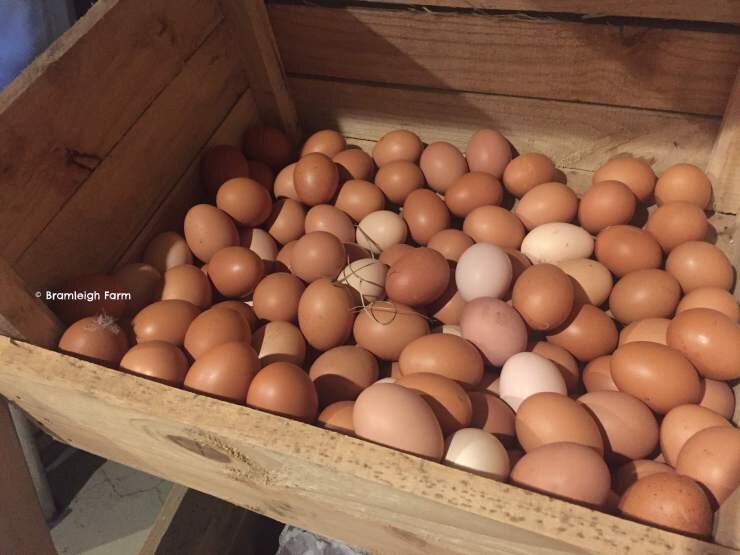
Weekly eggs
Happy hens, with not much news to report. A slight decline in egg production due to a steep increase in the number of broody hens! Because our chickens live a normal life, they experience natural instinctual rhythms… such as broodiness. As humans, we are aware that winter is coming and it is not an ideal time for chicks… or so we think… so we try to avoid broody hens. However, our hens are so happy that we have about 5 hens currently in a broody state! Interestingly, it is our Buff X and the Zulu hens that tend to go broody. Hens stop laying when they are broody so industry birds usually have this natural rhythm bred out. Our Lohmann hens are actually an industrial breed. They are much younger so it will be interesting to see if they ever start to go broody in future.
A broody hen’s core temperature increases to about 40C to enable her to incubate eggs. If the hen’s underside is cooled, it may be enough to bust her broodiness. The Eggmobile design means that hens only have the option of roosting or sitting on the mesh floor so this is normally sufficient to bust the brood. However, we have some very clever hens who break their way into the nesting boxes at night, and keep themselves warm in the sawdust. We have to find clever ways of keeping the nesting boxes closed to prevent the hens doing this! Hens will normally sit on eggs for 21 days. During this time they hardly leave the nest, maximum of 20 minutes a day. They lose a lot of weight. If left in the broody state for too long, they go into the same trance-like state as when sitting on eggs, and continue to lose weight without snapping out of it when chicks hatch. We had two broody hens who got to this point so we had to give them eggs to sit on. And out popped these 17 little darlings!
FREE RANGE PIGS
-
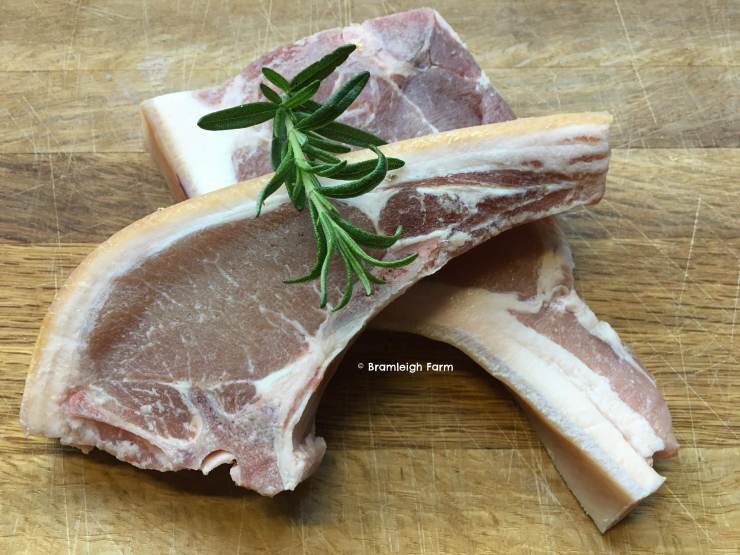
Free range pork chops
We have had two big events this month - one being finding a butcher that will make sausages and bacon for us, free of MSG, preservatives and other nasties. It has been quite a journey and stressful time dealing with 100s of kgs of meat, knowing which cuts we want, what will sell, and the processing side of this meat. We have had great response from our REKO customers that continues to inspire us! We're looking forward to tasting the sausages.
The second big event was the launch of a new restaurant in Nottingham Road, District 103, that served our pork belly at their soft opening on the Easter weekend!
Our piglets are growing rapidly, rootling like mad and are moving along the forest edges again. They loved all the rain and making mud baths this past week!
-
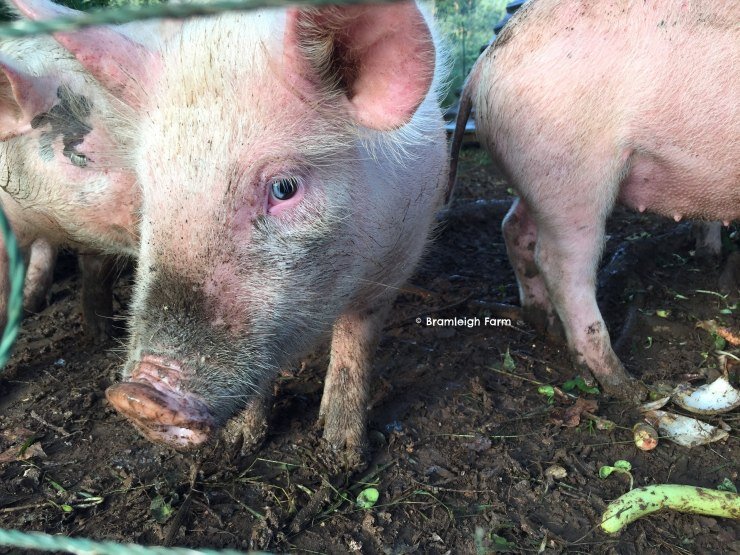
Rootling nose! -
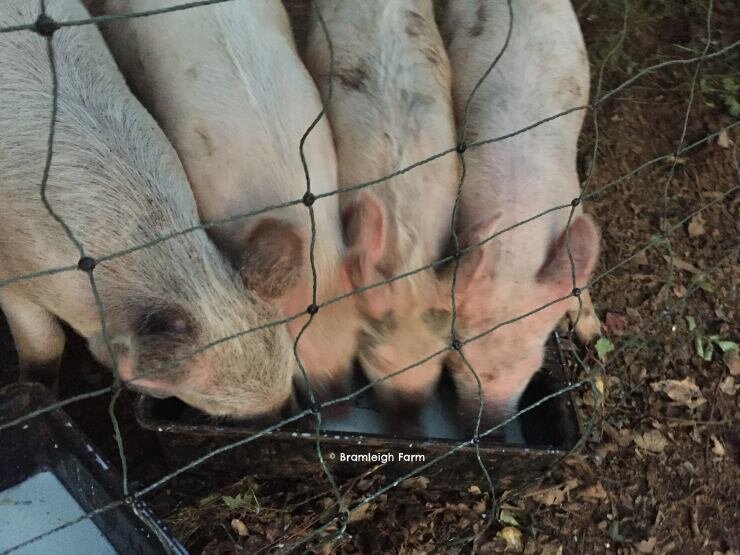
Every last sip of milk -
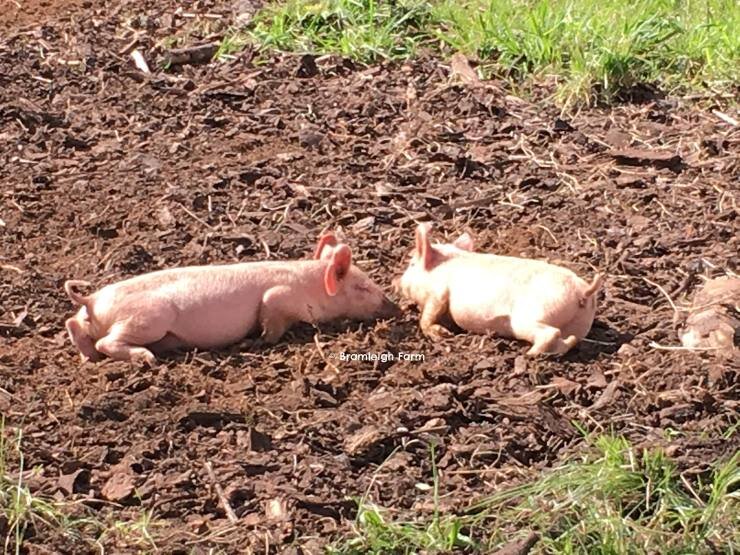
Snoozing in the sun with full bellies -
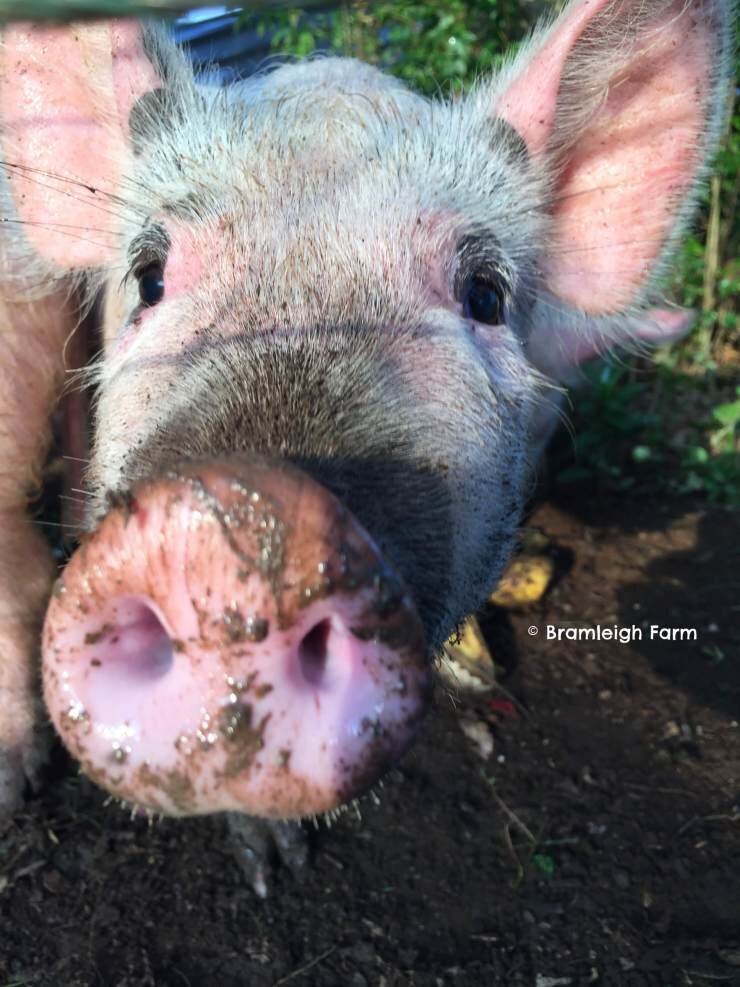
Mud bath diggin'
GUESTHOUSE
As April draws to a close, so does our busy season. We tend to have two busy seasons - the December/January season and March/April; long weekends, Easter, and an ideal season for Midlands weddings. Now we shift all of our focus onto the farm for the last few weeks before the first frost and try to cram in as much as we can, and start preparing for the winter season ahead. Lots more planning ahead!
-
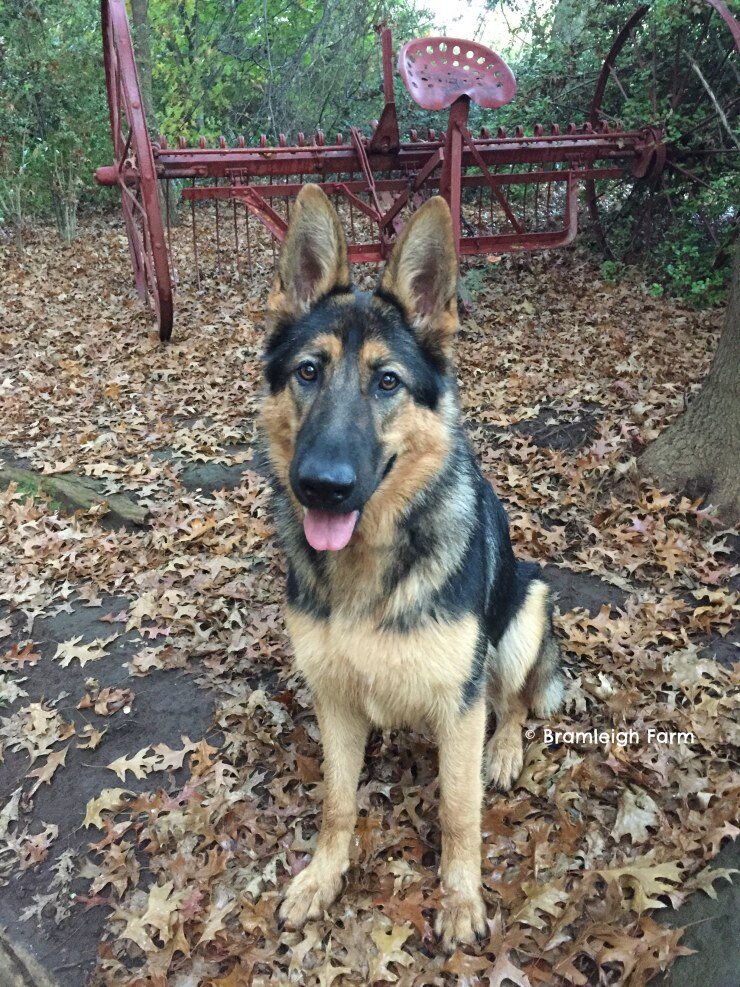
Zoe enjoying Autumn leaves -
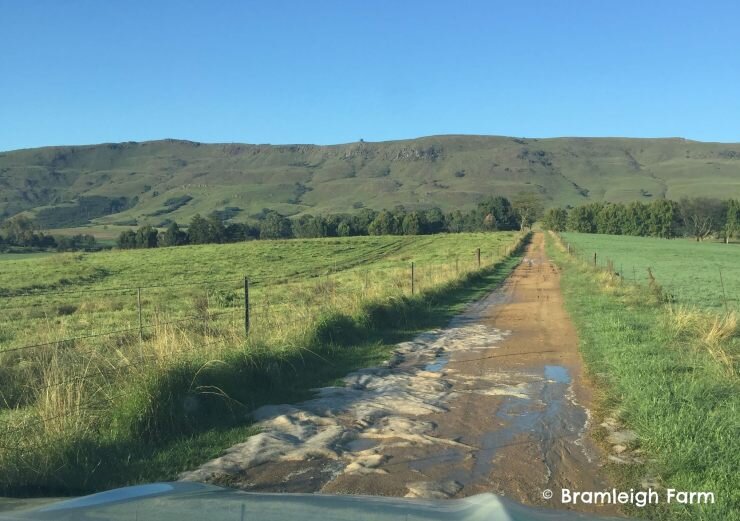
Hail, left over from the night before -
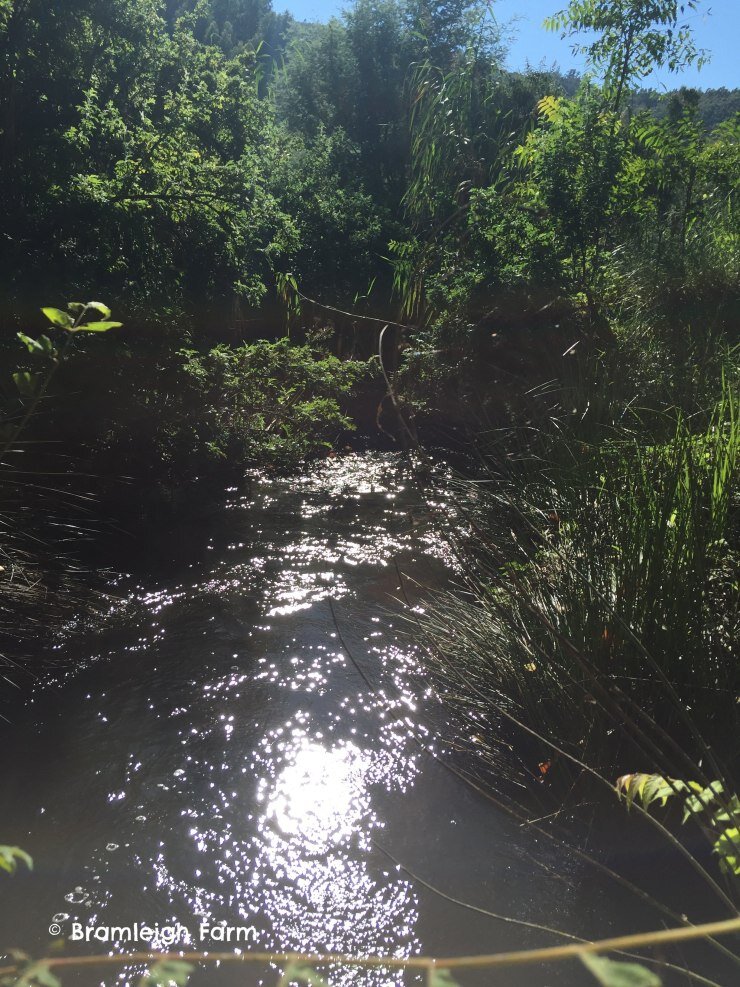
Full stream -
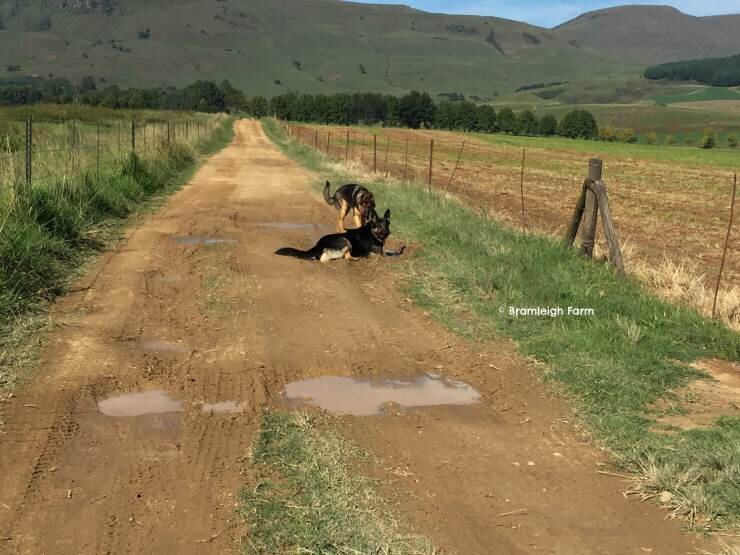
Wet roads and high traffic during the heavy rain means that potholes are now ponds!
We are continually grateful to our staff, both in the guesthouse and on the farm, who have helped us keep the ship afloat, allowing us time to also work on our business and not always in it where you don’t see what needs to be seen.
MARKET GARDEN
We keep on keeping on, fighting against weeds and trying to build fertility. Our carrots continue to prove popular and sell out like mad! We are now harvesting green runner beans and Blue Peter beans, a beautiful purple bean.
The balance of production and marketing
We have learnt a lot about marketing recently. Running a farm is less about running a farm than it is about running a business! We probably spend close on equal proportions of time actually farming as we do marketing!
We have also learnt that while we may have come into this business totally under equipped to run a farm, we came in also totally under equipped to run a business! But we have grown into the skills we needed - the practicalities of farming, the language and design of marketing and various other skills that we have been able to grow. This has helped us to acknowledge our own strengths and weaknesses, the strengths and weaknesses within each other, and how we balance those between us. We have to learn to balance the actual production and the marketing - a well produced product has to be sold somehow, while needing a well produced product to sell in the first place! Again, our favourite podcast, GrassFed Life, has really helped us.
We have learnt about balance recently too - not only the balance of work and play (that is a continual work in progress!) but also balancing what we believe in, what customers want, what the market wants. This has been on the farm and in the guesthouse. It is a challenge trying to be regenerative in our lifestyle and then living essentially in a public space where others do not necessarily see that, or appreciate those aspects at all - from cheap, unseasonal food to water and electricity usage. But, it encourages us to be in a position to not just hide on a hill but to be able to invite people to see, live and discuss the small changes that can make a big difference. (Sounds ideal but can be very frustrating!)
Ethics vs economics
Regenerative lifestyle vs running a business
That same lesson is one we continually grapple with ourselves - the small changes that can make a big difference. There are plenty of alterations we could make to our farm and guesthouse to make it run more efficiently in all ways - economically, socially, spiritually and environmentally. Yet we also have to balance this by ensuring we make a successful business to actually encourage others. There is no point in us investing every last cent in being the most efficient before we start, and then never actually starting. A business that goes bust doesn’t help anyone.
Start with the small, promote the positive, and continually strive to improve the rest.
So yes, we still package some of our products in plastic. We still transport our animals to an abattoir. This is less than ideal. Sometimes it seems the bar is just too high - these downfalls apparently nullify everything else that we are doing - farming not just sustainably but regeneratively and ethically, starting a local food market, part of ecotourism… As a small business we can’t yet afford the cost of other forms of packaging - or there is just aren’t suitable options for our frozen products (horror images of Durban beachfront after the rain will hopefully help change mindsets!). Setting up a farm abattoir is not easy, not cheap, and requires commitment - from producer and consumer. But we are doing the best we currently can. We have given those animals the best life. But we know we want to do better for the animals in our care but without the support of our customers, we can’t do that. It is a fine balance between economics and ethics. Having a relationship with your farmer means you can express these concerns. But it also means that the farmer can appeal for support from the consumer. Lets carry this risk together. That’s how relationship works.
We may not have all the water saving devices possible in the guesthouse but we have changed our lighting, we use all natural cleaning products, we run off solar power, we are doing the best we currently can but that is not where it ends. There is always space for improvement. These things all come at a cost to ensure everything we do is in line with our values. We are doing our best to negotiate that, providing our customers with the best quality products/services we can currently offer and behind the scenes, crunching the numbers to constantly improve.
We started our broiler enterprise last year March, and layers only went mobile at the end of last year. It is early days and those differences are small, but surely not insignificant. Its 200 chickens a month that didn’t live in confinement. Its 75 chickens worth of eggs every day that lived a natural life. Its 3 - 4 groups of guests every weekend that stayed eco-friendly. And it is not just us. These are the things we are familiar with, but there are countless others who slog away daily to better the world in their own way. It’s the little steps.
Start with the small, promote the positive, and continually strive to improve the rest.
Judging what isn’t there while ignoring what is, is a little unfair. We want to grow. And anyone who knows us, knows we are always searching for better. So grow with us. Support us. Support your local farmers, local businesses, they’re all trying!

